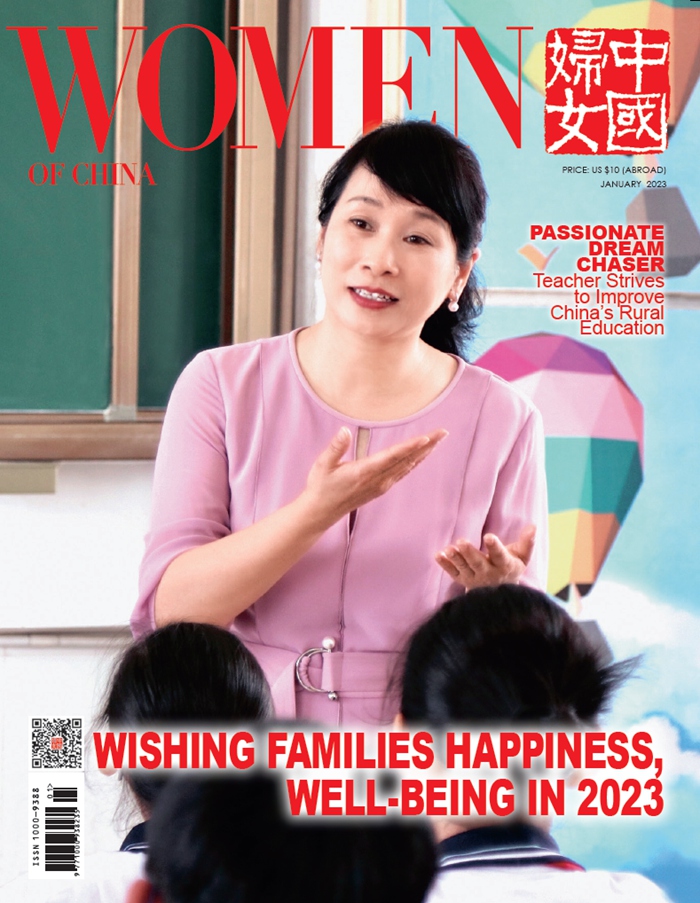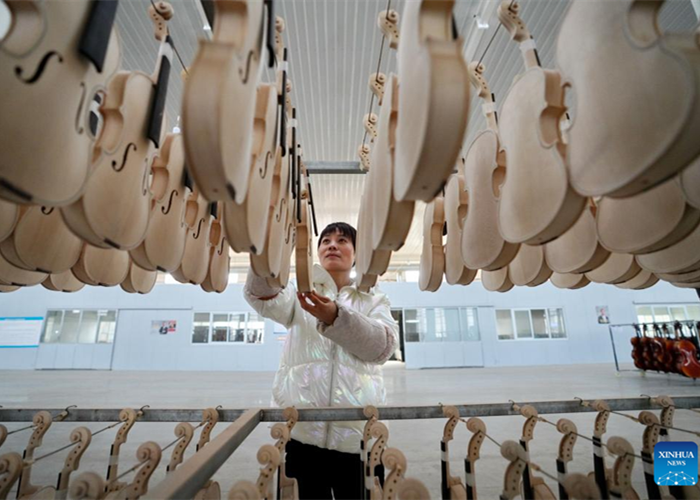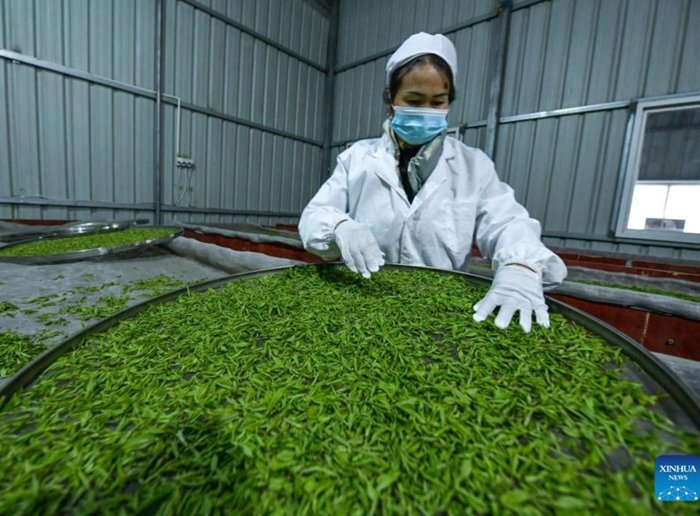Online Women Influencers Lift Rural People out of Poverty
Women influencers in remote rural areas are contributing to poverty alleviation by selling local specialties of their hometowns on livestreaming platforms in the battle against poverty and building a moderately prosperous society in all respects.
The efforts have promoted local products, increased rural people's income and energized the rural economy, creating a targeted poverty alleviation model that enables farmers to escape poverty through expanding production and sales by themselves.
He Qianru: Village Official Boosts Rural Industry via Livestreaming
He Qianru, a woman of Naxi ethnic group, resolutely went back to her hometown to be an official in Langbazhai Village, Luzhang Town, Lushui City, Nujiang Lisu Autonomous Prefecture, Southwest China's Yunnan Province, after she graduated from the Kunming University of Science and Technology in 2015. She wanted to be on the front line in the fight against poverty in Nujiang, one of the most impoverished regions in the country.
Langbazhai is located deep in the Gaoligong Mountains. The climate is humid. In the past, most of the villagers made a living by planting corn and rice with annual per capita income less than 2,000 yuan (US $285.8).
He soon found that matsutake (a kind of mushroom) could be a good source of income after she came to the village. She learned techniques from various sources, guided villagers to find matsutake, and purchased equipment to preserve the mushrooms.
Matsutake tastes fresh within only three days. If it is not sold as soon as possible, it will be worthless. So He began to sell the mushrooms through online stores and livestreaming platforms.
Given her efforts, the matsutake in Langbazhai becomes famous. It is sold across the country through the Internet and is now one of the designated suppliers of a famous food show.
Although matsutake is profitable, it is an "unstable industry" that depends on the weather. How could villagers achieve stable income growth? After discussing with a member of the village-stationed poverty alleviation team in Langbazhai, she felt that cultivating common morel (another kind of mushroom) would be a good solution, since the village has high forest coverage, good water quality and fertile soil.
They raised money to build a planting base and gained relevant knowledge. Although the morel harvest in the spring of 2017 was not a good one, the net profit was more than 6,000 yuan (US $857.4) per acre.
The livestreaming shows of mushrooms also boosted sales of sausages, eggs, black sugar and dried beef in the village.
"Encouraging villagers to find market through online platforms is a good way to help them be self-independent in production, promotion and earning income," said He.
Wuyinga: Mongolian Woman Shares Hometown's Scenery, Culture Online
Wuyinga graduated from Inner Mongolia University of Finance and Economics and went back to her hometown to start her own business in 2017.
Once when she was on a train, the passenger next to her asked curiously whether everyone can ride horses and shoot arrows in her hometown. Do they only eat lamb and no vegetables? Are horses their only transportation?
She realized that people have strong interest in Mongolian culture but don't know much about people's life in Inner Mongolia, so in 2018 she decided to promote both the folk culture of the Mongolian ethnic group and the beautiful scenery of her hometown via short videos and a livestreaming platform. Now she has nearly 550,000 followers.
"People lack a sense of security when they travel to an unfamiliar place. After they watch my video, people will trust me and come here," said Wuyinga. Wuyinga's uncle runs a tourist attraction. Once Wuyinga recorded the construction process of her uncle's Mongolian yurt, the video brought more than 100 tourists to her uncle's place, greatly increasing his income.
Many people ordered local specialties via her livestreaming shows and she once set a record of sales valued at 192,000 yuan (US $ 27,430) in three days. In the past two years, she created nearly 800 short videos to over one million viewers on the Internet and created sales valued at more than seven million yuan (US $ 991,900).
Wuyinga said, "I hope to show the magnificent scenery as well as the people and culture of Inner Mongolia through the lens, so that more people can know what the grassland look like and how the Mongolian people live thousands of miles away without leaving home."
Gerongzhuomu: Young Internet Celebrity Promotes Tibetan Specialties Online
Gerongzhuomu is a post-95s Tibetan woman who lives in Gongsha Village, Ganzi Tibetan Autonomous Prefecture, Southwest China's Sichuan Province. With thousands of followers on short-video platform Kuaishou, she is a beneficiary of the Happy Countryside Project and was invited to attend a training program in Tsinghua University. She drove the villagers to sell products worth more than 4 million yuan (US $571,600) in 2019, which was four times the sales level of the previous year.
Once she let her father take a video of her and her mother picking cordyceps (a kind of Chinese medicine), and it received more than 500,000 views. Hundreds of people asked her how to buy cordyceps after they watched the video.
Since cordyceps has a potential market, Gerongzhuomu and her husband Du Mokui started using short videos to promote local specialties. In the digging season, the couple lives on the mountain at an altitude of more than 4,800 meters for a month, where the environment is tough.
In addition to the videos of digging cordyceps and matsutake, Gerongzhuomu also prepared some videos showing the beautiful scenery and folk culture of her hometown, including blue sky, rainbow, mountains, and ethnic costumes.
Gerongzhuomu established a cooperative to help villagers increase their income in 2019. She is now preparing to develop a homestay business to boost local tourism.
"People from all over the country have come to experience life," said Gerongzhuomu, adding that some tourists come to dig matsutake while others come to paint pictures or just relax. They often stay for two or three months.
"I enjoy my life now, and I hope to stay in my hometown to help more people," she said.
Shi Linjiao: Returned College Student Uses Web to Improve Local People's Lives
 |
| Shi Linjiao is one of the first generation of college students who returned to Shibadong, their hometown and a village in Hunan Xiangxi Tujia and Miao Autonomous Prefecture, Central China's Hunan Province, and started their businesses. [Xinhua/Xue Yuge] |
Shi Linjiao is one of the first generation of college students who returned to Shibadong, their hometown and a village in Hunan Xiangxi Tujia and Miao Autonomous Prefecture, Central China's Hunan Province, and started their businesses.
Shi worked in a company in Liuyang City, Hunan Province, after she graduated from Zhejiang Conservatory of Music.
She quit her job and returned to her hometown in early 2020 and started her own business together with two other returned college students. They have helped local villagers sell specialties via short videos and livestreaming.
The videos they made and uploaded to Douyin, a popular video-sharing platform, are usually 10 seconds long and feature the 24-year-old woman's daily life in the rural areas.
They depict her making smoked Miao-style bacon, transplanting rice seedlings, picking up firewood and feeding chickens.
The videos quickly attracted viewers curious about this village. The most liked comments included: "This Miao village situated in green mountains and clear water has the taste and smell of an earthly life," "The video reminds me of my childhood" and "So that's how Miao-style bacon is cooked. I want to buy some."
Over the past five months, the team has helped villagers sell specialties worth about 40,000 yuan ($5,720), including smoked bacon, pickled radish and Miao clothing.
"To start a business in my hometown and make small contributions to my hometown's development is my lifelong pursuit," said Shi.
(Women of China)
Please understand that womenofchina.cn,a non-profit, information-communication website, cannot reach every writer before using articles and images. For copyright issues, please contact us by emailing: website@womenofchina.cn. The articles published and opinions expressed on this website represent the opinions of writers and are not necessarily shared by womenofchina.cn.








 WeChat
WeChat Weibo
Weibo 京公网安备 11010102004314号
京公网安备 11010102004314号